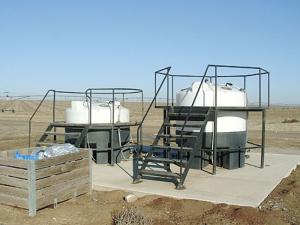They "Brew" Compost Tea In Big Batches
 ✖  |
Scott Grimes brews tea in 1,000-gal. batches using "giant tea" bags he mixes up filled with worm castings, cow manure, kelp and molasses. Called compost tea, he uses the home brew to feed soil and vegetable crops at Watt Brothers Farms, Paterson, Washington. As the manager of fertilizer operations, Grimes is responsible for brewing and application, and he says the benefits have been impressive.
"We use it as a soil conditioner," he explains. "We had a lot of water penetration problems and had been using different microbial products, but they didn't seem to be activated. The tea seems to innoculate the products and wake them up. We have seen definite improvements in water penetration, more organic matter, better root development and better nitrogen release."
At Watt Brothers, the tea is applied by center pivot irrigation systems. Grimes puts it on at the rate of 3 gal. per acre, although he admits other compost tea users go as high as 8 to 10 gal. per acre. Production costs for the soil elixir is about 25ů per gallon.
Grimes started out trying his own mixes and sending samples to the Soil Food Web, Inc., Corvallis, Washington (ph 541 752-5066). Grimes also works with Bruce Elliot, EMP, Inc.(ph 767-2747). Elliot builds compost tea machines and sells various ingredients.
You can't make good tea without good water, whether it's compost tea or English Breakfast. Grimes prefers river water and warns against well water or even worse, city water. "You can't use city water because of the chlorine. Well water often has high levels of calcium and sulfurs. River water is already biologically active," he notes.
The key to good compost tea is to keep the mix active and that requires lots of air. Grimes has designed his system to inject the air bubbles. His venturi tube system releases small, very fine bubbles into the solution through the sandstone base at the bottom of the tanks.
It is the oxygen component that Grimes feels śwakes' up the microbes and puts them to work. It takes him one to two days to percolate his tea, relying on the air to keep the water churning. The warmer it is, the faster the tea is finished. He applies it at the rate of about 3 gal. per acre through the more than 200 center pivots at Watson Farms.
A 1,000-gal. compost tea system sell for about $4,000.
Contact: FARM SHOW Followup, Tony Grimes, Waatts Brothers Fertilizer Inc., 350 Highway 221, Paterson, Wash. 99345 (ph 509 875-2022; E-mail: tgrimes@wattsbros. com).

Click here to download page story appeared in.
Click here to read entire issue
They "Brew" Compost Tea In Big Batches FARM HOME Miscellaneous 27-2-19 Scott Grimes brews tea in 1,000-gal. batches using "giant tea" bags he mixes up filled with worm castings, cow manure, kelp and molasses. Called compost tea, he uses the home brew to feed soil and vegetable crops at Watt Brothers Farms, Paterson, Washington. As the manager of fertilizer operations, Grimes is responsible for brewing and application, and he says the benefits have been impressive.
"We use it as a soil conditioner," he explains. "We had a lot of water penetration problems and had been using different microbial products, but they didn't seem to be activated. The tea seems to innoculate the products and wake them up. We have seen definite improvements in water penetration, more organic matter, better root development and better nitrogen release."
At Watt Brothers, the tea is applied by center pivot irrigation systems. Grimes puts it on at the rate of 3 gal. per acre, although he admits other compost tea users go as high as 8 to 10 gal. per acre. Production costs for the soil elixir is about 25ů per gallon.
Grimes started out trying his own mixes and sending samples to the Soil Food Web, Inc., Corvallis, Washington (ph 541 752-5066). Grimes also works with Bruce Elliot, EMP, Inc.(ph 767-2747). Elliot builds compost tea machines and sells various ingredients.
You can't make good tea without good water, whether it's compost tea or English Breakfast. Grimes prefers river water and warns against well water or even worse, city water. "You can't use city water because of the chlorine. Well water often has high levels of calcium and sulfurs. River water is already biologically active," he notes.
The key to good compost tea is to keep the mix active and that requires lots of air. Grimes has designed his system to inject the air bubbles. His venturi tube system releases small, very fine bubbles into the solution through the sandstone base at the bottom of the tanks.
It is the oxygen component that Grimes feels śwakes' up the microbes and puts them to work. It takes him one to two days to percolate his tea, relying on the air to keep the water churning. The warmer it is, the faster the tea is finished. He applies it at the rate of about 3 gal. per acre through the more than 200 center pivots at Watson Farms.
A 1,000-gal. compost tea system sell for about $4,000.
Contact: FARM SHOW Followup, Tony Grimes, Waatts Brothers Fertilizer Inc., 350 Highway 221, Paterson, Wash. 99345 (ph 509 875-2022; E-mail: tgrimes@wattsbros. com).
To read the rest of this story, download this issue below or click
here to register with your account number.







